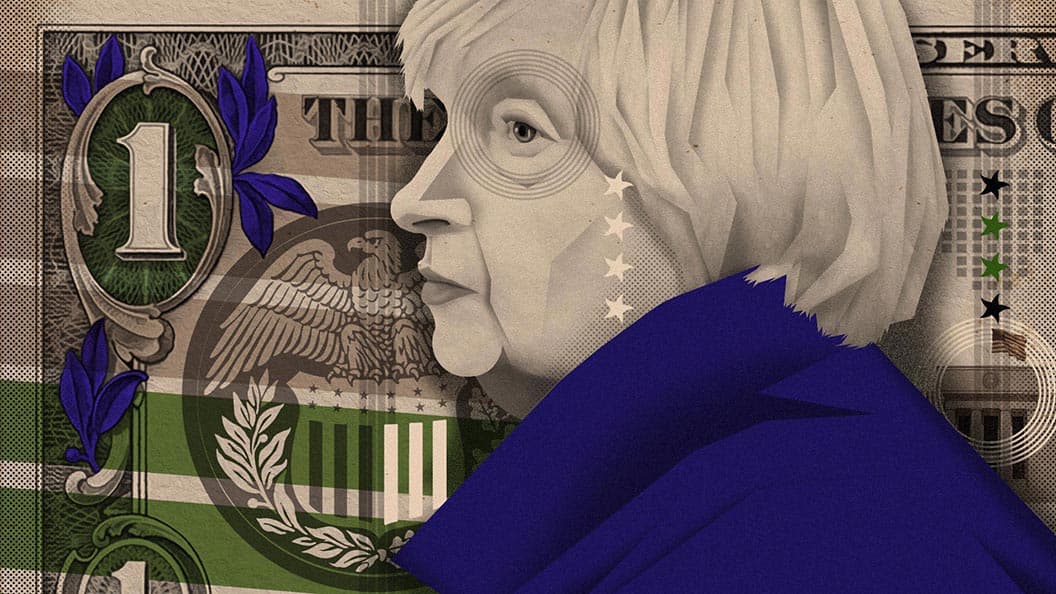Blockchain Innovation is Moving Faster than Policy-Making
Media reports say Treasury Secretary Janet Yellen is one of the loudest voices against an amendment to the infrastructure bill which would remove problematic language requiring cryptocurrency tax reporting.

Janet Yellen, US Secretary of the Treasury; Blockworks Exclusive Art by Axel Rangel
- A fundamental misunderstanding of the technology behind blockchain is at the core of the issue with cryptocurrency tax language in the infrastructure bill, Sarson Funds’ Jahon Jamali told Blockworks
- Digital assets investors and stakeholders say the bill as it stands is simply unrealistic from a compliance perspective and will lead to an offshoring of infrastructure
The fight to keep key elements of blockchain infrastructure such as nodes and wallets from being considered “brokers,” and be required to engage in tax reporting, now involves Treasury Secretary Janet Yellen as the Washington Post reported Friday.
But as Sarson Funds co-founder and fund manager Jahon Jamali explained to Blockworks, the fight is based on fundamental misunderstandings about the underlying technology that powers digital assets.
The amendment put forward by Senators Ron Wyden (D-Ore.), Pat Toomey (R-Pa.) and Cynthia Lummis, (R-Wyo.) keeps the definition of crypto “broker” — and with that the subsequent tax implications — quite strict. Yellen is lobbying against this amendment, according to the Washington Post.
However, a rival bi-partisan camp of Senators Rob Portman (R-Ohio), Mark Warner (D-Va.) and Kyrsten Sinema, (D-Ariz.) proposed another amendment that would add a broad scope of reporting requirements to blockchain infrastructure providers, which FTX founder and CEO, Sam Bankman-Fried explained on Twitter earlier today.
What has left many scratching their head is the explicit call out of proof-of-stake versus proof-of-work. While Bitcoin and Ethereum currently use proof-of-work, Ethereum is scheduled to move to proof-of-stake as part of its shift to ETH2.
What’s more curious to many is that proof-of-work has long been criticized for its reliance on mining and miners due to the perceived carbon footprint. Now, the sudden support for proof-of-stake is a neck-snapping flip-flop.
“I think the pace of innovation is clearly moving faster than policymaking,” Jamali told Blockworks. “While in some ways it solidifies bitcoin as a mainstay of the US financial system, the tax-reporting requirements for proof-of-stake protocols demonstrate a clear lack of understanding on how the technology works.”
Yellen and bankers feeling the DeFi heat
Jamal also pointed out that part of this is a product of incumbent financial institutions facing “clear competition” from decentralized finance (DeFi).
Indeed, according to lobbying disclosures, the American Bankers Association (ABA) spent nearly $3 million lobbying lawmakers during the fourth quarter of the year about a range of issues, including CBDCs and cryptocurrency.
“It seems that they’ve corralled support amongst some in DC,” Jamali said.
Other industry stakeholders have also pointed out that the impossible compliance requirements this bill proposes would put pressure on blockchain infrastructure providers to move offshore and shop around for favorable regulation.
“There’s a reason England doesn’t have any social media companies. There’s a reason France doesn’t have much of a financial services industry,” Preston Byrne, a Partner at Anderson Kill, and well-known voice in the crypto industry tweeted, referring to the former’s restrictive laws around free speech and the latter’s high taxes. “If the White House gets its way, there will be a reason that America doesn’t have a crypto industry.”
“This crypto bill happened because some staffer in a back room who has no idea how the tech works thinks that some Solidity code is going to send people 1099s,” he concluded.
Want more investor-focused content on digital assets? Join us September 13th and 14th for the Digital Asset Summit (DAS) in NYC. Use code ARTICLE for $75 off your ticket. Buy it now.






